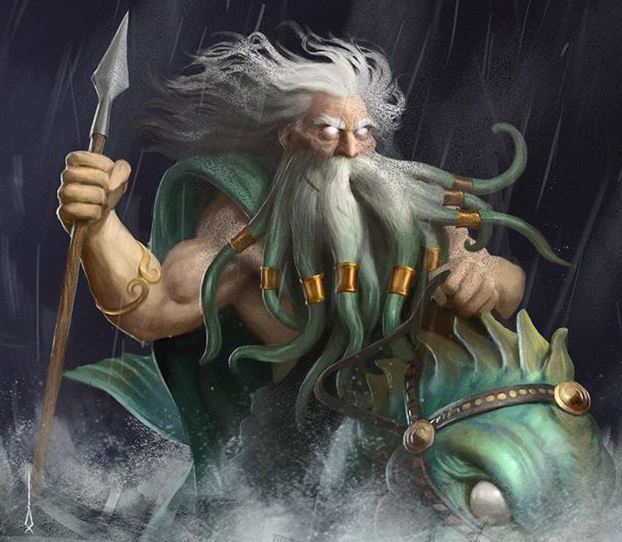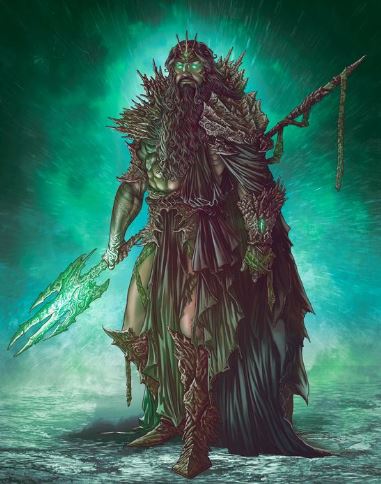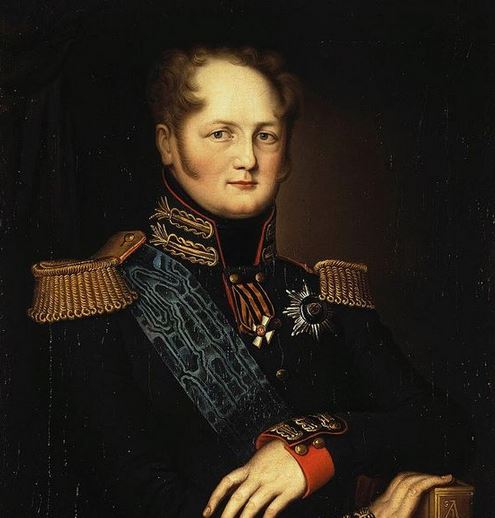Ægir is a prominent figure in Norse mythology, known as the god of the sea and associated with the primordial forces of the ocean. His character embodies the power and mystery of the sea, reflecting both its bountiful gifts and its perilous nature.
Mythological Background
Role and Attributes
Ægir is one of the primordial beings in Norse mythology, often depicted as a giant (jötunn) with a strong connection to the ocean. Unlike many other Norse gods, Ægir does not belong to the Aesir or Vanir, the primary families of gods. Instead, he is a giant whose role is primarily associated with the sea and its many facets.
- God of the Sea: Ægir is known as the god of the sea, representing both its majesty and its dangers. His domain includes the vast and unpredictable waters of the ocean.
- Personification of the Ocean: Ægir personifies the ocean’s power and depth. His character reflects the sea’s dual nature—capable of both providing sustenance and causing destruction.
Family and Relationships
Ægir is married to Rán, a sea goddess who personifies the violent aspects of the ocean. Together, they have nine daughters, known as the “waves” or “daughters of Ægir”. Each daughter represents different aspects of the sea, from the calm surface to the tumultuous storms.
- Rán: Ægir’s wife, often depicted as a fearsome figure who uses a net to catch drowned sailors and souls lost at sea.
- The Daughters: The nine daughters of Ægir and Rán symbolize various sea-related phenomena, including different types of waves and currents.
Mythological Stories
Ægir appears in several Norse myths and sagas, often in contexts related to feasts, sea voyages, and the natural world.
The Feast of the Gods
One of the most famous stories involving Ægir is his hosting of a grand feast for the gods. This event is detailed in the Skáldskaparmál, part of the Prose Edda. Ægir invites the gods to his underwater hall, where he serves them a lavish feast. The story highlights his role as a hospitable figure, despite his intimidating presence.
- The Feast: Ægir’s feast is characterized by the abundance of food and drink, which he provides with the help of his magical cauldron. The gods enjoy the celebration, showcasing Ægir’s role as a gracious host.
The Creation of Beer
In another tale, Ægir is credited with the creation of beer for the gods. This story emphasizes his importance in providing for the gods and ensuring their well-being. Ægir’s magical cauldron plays a crucial role in brewing the beer, highlighting his association with nourishment and festivity.

Symbolism and Worship
Ægir’s character symbolizes the ocean’s vast and unpredictable nature. As a primordial giant, he represents the raw power of the natural world, including its potential for both bounty and danger.
Symbolism
- Ocean’s Power: Ægir embodies the ocean’s immense power and its role in shaping the world and the lives of those who navigate it.
- Mystery and Danger: His associations with shipwrecks and storms reflect the unpredictable and often perilous nature of the sea.
Worship
Unlike many gods in the Norse pantheon, Ægir did not have a significant cult or formal worship practices. However, he was revered and respected by sailors and seafarers who acknowledged his influence over the sea. Offerings and rituals were likely performed to appease Ægir and ensure safe voyages.
Legacy and Influence
Ægir’s influence extends beyond Norse mythology into modern literature and popular culture. His character and stories have inspired various adaptations and references in contemporary works.
Modern References
- Literature and Media: Ægir appears in various modern literary works, films, and television shows that explore Norse mythology and its characters. His role as the god of the sea makes him a compelling figure in stories involving ocean adventures and maritime themes.
- Cultural Impact: Ægir’s legacy continues to influence how we understand the mythology of the Norse gods and their connection to the natural world. His stories and attributes reflect the enduring fascination with the sea and its mysteries.
Ægir is a central figure in Norse mythology, embodying the power, mystery, and duality of the sea. His role as the god of the ocean, combined with his connections to Rán and their daughters, highlights his importance in the mythological landscape. Through his stories and symbolism, Ægir continues to captivate and inspire, reflecting humanity’s ongoing relationship with the sea and its formidable forces.



